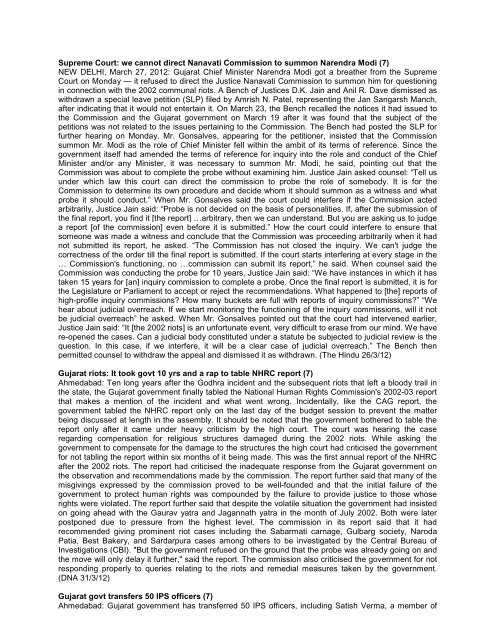Communal Riots-2012.pdf - Indian Social Institute
Communal Riots-2012.pdf - Indian Social Institute
Communal Riots-2012.pdf - Indian Social Institute
Create successful ePaper yourself
Turn your PDF publications into a flip-book with our unique Google optimized e-Paper software.
Supreme Court: we cannot direct Nanavati Commission to summon Narendra Modi (7)NEW DELHI, March 27, 2012: Gujarat Chief Minister Narendra Modi got a breather from the SupremeCourt on Monday — it refused to direct the Justice Nanavati Commission to summon him for questioningin connection with the 2002 communal riots. A Bench of Justices D.K. Jain and Anil R. Dave dismissed aswithdrawn a special leave petition (SLP) filed by Amrish N. Patel, representing the Jan Sangarsh Manch,after indicating that it would not entertain it. On March 23, the Bench recalled the notices it had issued tothe Commission and the Gujarat government on March 19 after it was found that the subject of thepetitions was not related to the issues pertaining to the Commission. The Bench had posted the SLP forfurther hearing on Monday. Mr. Gonsalves, appearing for the petitioner, insisted that the Commissionsummon Mr. Modi as the role of Chief Minister fell within the ambit of its terms of reference. Since thegovernment itself had amended the terms of reference for inquiry into the role and conduct of the ChiefMinister and/or any Minister, it was necessary to summon Mr. Modi, he said, pointing out that theCommission was about to complete the probe without examining him. Justice Jain asked counsel: “Tell usunder which law this court can direct the commission to probe the role of somebody. It is for theCommission to determine its own procedure and decide whom it should summon as a witness and whatprobe it should conduct.” When Mr. Gonsalves said the court could interfere if the Commission actedarbitrarily, Justice Jain said: “Probe is not decided on the basis of personalities. If, after the submission ofthe final report, you find it [the report] …arbitrary, then we can understand. But you are asking us to judgea report [of the commission] even before it is submitted.” How the court could interfere to ensure thatsomeone was made a witness and conclude that the Commission was proceeding arbitrarily when it hadnot submitted its report, he asked. “The Commission has not closed the inquiry. We can't judge thecorrectness of the order till the final report is submitted. If the court starts interfering at every stage in the… Commission's functioning, no …commission can submit its report,” he said. When counsel said theCommission was conducting the probe for 10 years, Justice Jain said: “We have instances in which it hastaken 15 years for [an] inquiry commission to complete a probe. Once the final report is submitted, it is forthe Legislature or Parliament to accept or reject the recommendations. What happened to [the] reports ofhigh-profile inquiry commissions? How many buckets are full with reports of inquiry commissions?” “Wehear about judicial overreach. If we start monitoring the functioning of the inquiry commissions, will it notbe judicial overreach” he asked. When Mr. Gonsalves pointed out that the court had intervened earlier,Justice Jain said: “It [the 2002 riots] is an unfortunate event, very difficult to erase from our mind. We havere-opened the cases. Can a judicial body constituted under a statute be subjected to judicial review is thequestion. In this case, if we interfere, it will be a clear case of judicial overreach.” The Bench thenpermitted counsel to withdraw the appeal and dismissed it as withdrawn. (The Hindu 26/3/12)Gujarat riots: It took govt 10 yrs and a rap to table NHRC report (7)Ahmedabad: Ten long years after the Godhra incident and the subsequent riots that left a bloody trail inthe state, the Gujarat government finally tabled the National Human Rights Commission's 2002-03 reportthat makes a mention of the incident and what went wrong. Incidentally, like the CAG report, thegovernment tabled the NHRC report only on the last day of the budget session to prevent the matterbeing discussed at length in the assembly. It should be noted that the government bothered to table thereport only after it came under heavy criticism by the high court. The court was hearing the caseregarding compensation for religious structures damaged during the 2002 riots. While asking thegovernment to compensate for the damage to the structures the high court had criticised the governmentfor not tabling the report within six months of it being made. This was the first annual report of the NHRCafter the 2002 riots. The report had criticised the inadequate response from the Gujarat government onthe observation and recommendations made by the commission. The report further said that many of themisgivings expressed by the commission proved to be well-founded and that the initial failure of thegovernment to protect human rights was compounded by the failure to provide justice to those whoserights were violated. The report further said that despite the volatile situation the government had insistedon going ahead with the Gaurav yatra and Jagannath yatra in the month of July 2002. Both were laterpostponed due to pressure from the highest level. The commission in its report said that it hadrecommended giving prominent riot cases including the Sabarmati carnage, Gulbarg society, NarodaPatia, Best Bakery, and Sardarpura cases among others to be investigated by the Central Bureau ofInvestigations (CBI). "But the government refused on the ground that the probe was already going on andthe move will only delay it further," said the report. The commission also criticised the government for notresponding properly to queries relating to the riots and remedial measures taken by the government.(DNA 31/3/12)Gujarat govt transfers 50 IPS officers (7)Ahmedabad: Gujarat government has transferred 50 IPS officers, including Satish Verma, a member of
















